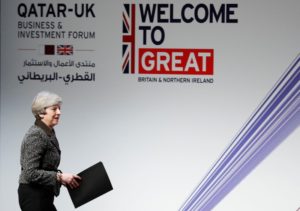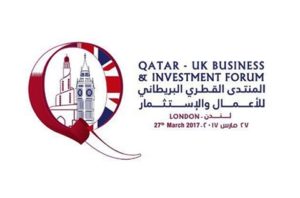

Participants returning from the recent Qatar-UK Business and Investment Forum in Britain say its highlighting of numerous opportunities to expand economic relations between the two countries should help to allay concerns about the impact of Brexit.
The forum took place in London and Birmingham on March 27 and 28, just before the United Kingdom invoked Article 50 of the Treaty on European Union, officially notifying the EU of its intention to leave the bloc. The prospect of an end to unfettered British access to European markets has underlined the need for the UK to develop its bilateral trade and investment ties with other countries around the world.
Energy expert Roudi Baroudi, CEO of Doha-based Energy and Environment Holding, an independent consultancy, took part in the London activities. He says that while the general mood in Britain’s business community is one of uncertainty, the forum could not have come at a better time.
“In many ways, Qatar and Britain are made for each other, and not just because of the historical links between the two,” he explained. “Now more than ever, British companies and investors will need to find new partners outside Europe, and Qatar has spent much of the past decade transforming itself into a global player with increasingly diverse relationships with key economies around the world. It’s a perfect fit.”
Baroudi says that while much of the media focus in recent years has been on Qatari investments in British assets of over £ 60 Billion, there also is great potential for funds flowing the other way, and from European and other countries as well.
“Qatar offers an incredibly attractive climate for British and other foreign investors, everything from high standards of regulation and transparency to impressive sociopolitical stability and world-class credit ratings,” he enthused. “And this is not to mention the fact that it has the world’s third largest natural gas reserves and highest per capita GDP, both of which rightly inspire great confidence.”
“On top of all that, the government welcomes foreign investment with open arms and on business-friendly terms, and its development program is proceeding at a torrid pace, especially in terms of infrastructure and tourism,” he added. “There are opportunities for everyone – architecture, engineering and construction firms, project managers, retailers, hotels and restaurants, and anyone who deals in the expertise, equipment and materials required to carry out such projects.”
Indeed, Qatar is in the midst of a construction boom driven by its far-reaching Vision 2030 development plan and its hosting of the 2022 FIFA World Cup. The centerpieces include extensive upgrades of the ports country’s road, rail, water, and sewage networks, as well as several new stadiums to accommodate the world’s most widely anticipated sporting event.
All this is taking place, too, despite less-than-ideal exogenous conditions. Public finances have slightly deteriorated because of falling global commodity prices, and 2016 saw the Qatari government run its first budget shortfall in 15 years. Given the virtually bottomless revenue well supplied by the country’s gas reserves, however, many analysts dismiss the current fiscal situation as a temporary aberration. In addition, the Finance Ministry has won accolades for its prudent management of the impact from falling oil and gas prices, and currents forecast predict a return to surplus in 2019 if prices continue to recover.
Baroudi said he was not worried about Brexit, arguing that British businesspeople were savvy enough to reorient their activities to find new markets for their exports and new destinations for their investments. As for Qatari investors, he noted that they have been diversifying into British and other assets for a long time, so they know the market well.
As for the interactions he witnessed at the Qatar-UK forum, he said they indicated a “true sense of partnership” among and between the two countries’ business and investment communities.
“From what I saw there was great understanding of both the challenges that lay ahead and their potential to spur greater cooperation and therefore generate more opportunities,” he concluded. “And the word is getting out. These are people who do their homework, many are already aware that Qatar’s capital markets are growing by leaps and bounds, and if they’re not, the Qatar Financial Center Authority is letting them know with a series of roadshows to increase awareness and generate greater outside interest.”
The QFCA recently sent a high-powered delegation to Germany, and several other stops are planned for Asia, North America, and other European countries later this year.
Overall, Baroudi concluded, “the combination of pro-growth economic policies, a constructive foreign policy, and significant investments in other countries has helped to make Qatar a genuine player on the world stage, both politically and economically. And now that Britain is looking beyond Europe a little more, the outlook couldn’t be better.”


